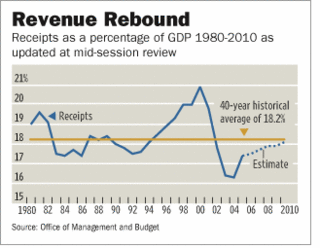"It was the best of times, it was the worst of times, it was the age of wisdom, it was the age of foolishness, it was the epoch of belief, it was the epoch of incredulity, it was the season of Light, it was the season of Darkness, it was the spring of hope, it was the winter of despair, we had everything before us, we had nothing before us…"
— Charles Dickens’ “A Tale of Two Cities”
In the immediate aftermath of Katrina – as the world learned that it was largely the poor and the destitute that got left behind in New Orleans – The Washington Post reported, “The poverty rate climbed in 2004 to 12.7 percent, from 12.5 percent in 2003 -- the fourth year in a row that poverty has risen.” After falling throughout the Clinton presidency, from a ten-year high of 15.1% in 1993 to a 27-year low of 11.3% in 2000, the poverty rate resumed its upward march during President George W. Bush’s first term. This climb has been analogous to the hike in the poverty rate through much of his father’s term (1990-92), which had then followed a near identical (to Clinton) slide in the poverty rate during the Reagan “seven fat years (1983-89)”. Coincidentally, Hurricane Andrew, which devastated the southern Florida peninsula and south-central Louisiana in 1992, had been the most expensive natural disaster in United States history prior to Hurricane Katrina. It would seem to me that the Bush Karma, which I wrote about in my recent book, “The Bush Diaries”, continues to dog this presidency.
As the President now simultaneously grapples with the myriad problems of having to manage a war abroad and a crisis of gargantuan proportions at home, he might want to come to terms with the implications of this biblical prophecy:
“Whatsoever a man soweth, that shall he also reap.” – Galatians 6:7
In the light of the Bush Administration’s dismal performance in the wake of Katrina, whose progress had been closely monitored and whose after-effects had been widely anticipated, it’s only logical that a majority of American citizens are expressing “shock and awe” at the gross incompetence of the Bush Administration. It might have taken President Bush seven long minutes to get off his chair in that Florida elementary school after being informed about a second plane hitting the World Trade Center, but this time around it took him closer to 7000 minutes after Katrina had made landfall to finally show up in New Orleans!
It’s quite apparent, from his recent televised address to the nation from the Big Easy, that President Bush has realized that his legacy is going to be determined by the "tale of two cities": Baghdad and New Orleans. By the end of his second term, he will have likely spent upwards of $200 billion each in the reconstruction of Iraq and the U.S. Gulf states. We all know that he, and the indomitable American spirit, will succeed in restoring the Big Easy—because throughout history Man has eventually prevailed over Nature's wrath. The more questionable outcome is going to be in the Huge Messy—will President Bush succeed in rebuilding Iraq and be able to leave it with a functioning government and an orderly society—since recovery from this disaster, one largely of his own making, is highly unpredictable. I suspect that 9/11 and the tale of those two other “Bush Doctrine-bestowing” cities, New York and Washington, will fade into the background as far as the ultimate Bush legacy is concerned—and for this the President has only himself to blame!

